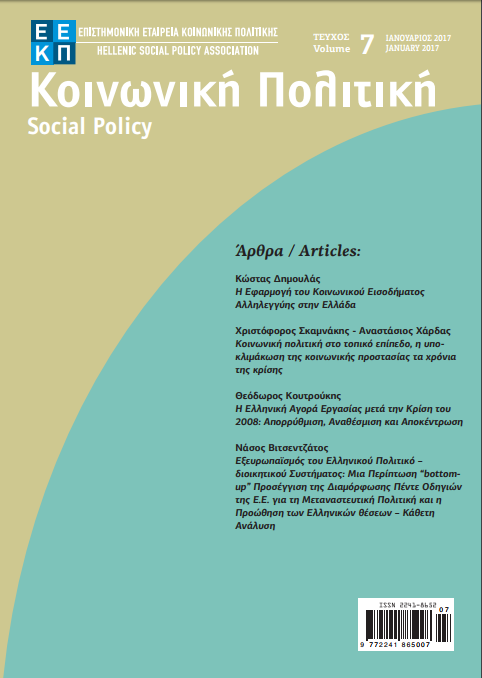Εξευρωπαϊσμός ελληνικής μεταναστευτικής πολιτικής: Κάθετη ανάλυση της διαμόρφωσης πέντε Οδηγιών της Ε.Ε. και η προώθηση των ελληνικών θέσεων

Abstract
This article is dealing with the extent and the way of how the Greek political-administrative system affected the EU policy for legal immigration during its formulation phase. It adopts a “bottom-up” approach on the europeanization process of the Greek political-administrative system at the level of public policy formulation.
The methodological framework context of the research is based on empirical evidence from 5 case studies of EU immigration policy Directives in the field of legal migration, that were formed during the negotiation phase at the “Migration and Expulsion” Working Group of the Council of the European Union.
The core hypothesis of the article suggests that Greece, during the period 2001-2005, as an EU member state, achieved to promote its positions, by taking advantage of the country’s participation in the formulation of the 5 EU Directives on legal migration policy.
Article Details
- How to Cite
-
Βιτσεντζάτος Ν. (2017). Εξευρωπαϊσμός ελληνικής μεταναστευτικής πολιτικής: Κάθετη ανάλυση της διαμόρφωσης πέντε Οδηγιών της Ε.Ε. και η προώθηση των ελληνικών θέσεων. Social Policy, 7, 53–72. https://doi.org/10.12681/sp.14169
- Issue
- Vol. 7 (2017)
- Section
- Articles

This work is licensed under a Creative Commons Attribution 4.0 International License.
Authors who publish with this journal agree to the following terms:
Authors retain copyright and grant the journal right of first publication with the work simultaneously licensed under a Creative Commons Attribution Non-Commercial License that allows others to share the work with an acknowledgement of the work's authorship and initial publication in this journal.
Authors are able to enter into separate, additional contractual arrangements for the non-exclusive distribution of the journal's published version of the work (e.g. post it to an institutional repository or publish it in a book), with an acknowledgement of its initial publication in this journal.
Authors are permitted and encouraged to post their work online (preferably in institutional repositories or on their website) prior to and during the submission process, as it can lead to productive exchanges, as well as earlier and greater citation of published work.


